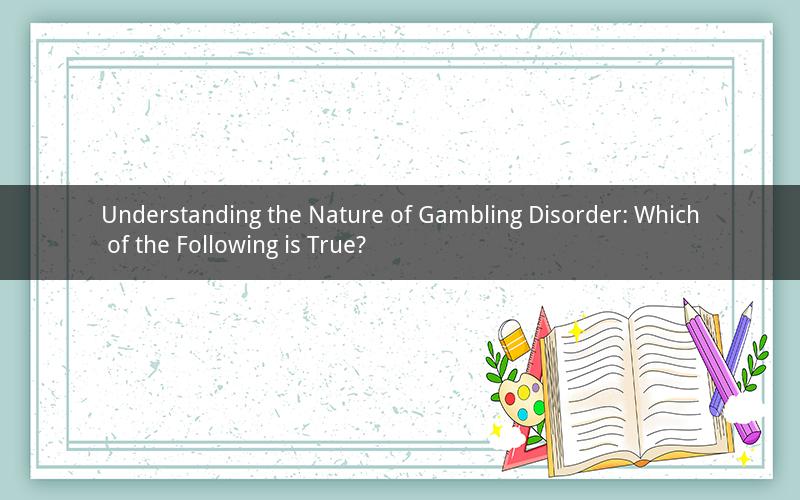
Gambling disorder, also known as problem gambling, is a significant public health concern that affects millions of people worldwide. This disorder is characterized by an inability to control or stop gambling, despite negative consequences. In this article, we will explore the various aspects of gambling disorder, including its symptoms, causes, treatment options, and the truth behind common misconceptions. Finally, we will address five frequently asked questions related to gambling disorder.
Symptoms of Gambling Disorder
The first step in understanding gambling disorder is to recognize its symptoms. The American Psychiatric Association (APA) defines gambling disorder as a mental health condition that involves a pattern of gambling behavior leading to significant problems or distress. Some common symptoms include:
1. Needing to gamble with increasing amounts of money to achieve the desired excitement.
2. Feeling restless or irritable when attempting to cut down or stop gambling.
3. Returning to gambling after losing money to recoup losses.
4. Spending a significant amount of time thinking about gambling, preoccupied with planning the next gambling venture, or reliving past gambling experiences.
5. Risking or losing a relationship, job, or educational or career opportunity because of gambling.
6. Continuing to gamble despite knowing the serious, negative consequences.
Causes of Gambling Disorder
Several factors can contribute to the development of gambling disorder. These include:
1. Genetic predisposition: Research suggests that genetics play a role in the development of gambling disorder, with some individuals being more susceptible to the disorder than others.
2. Environmental factors: Exposure to gambling opportunities, such as casinos or online gambling platforms, can increase the risk of developing a gambling disorder.
3. Psychological factors: Individuals with certain personality traits, such as impulsivity and thrill-seeking behavior, may be more prone to developing a gambling disorder.
4. Social factors: Peer pressure, family dynamics, and other social influences can also contribute to the development of gambling disorder.
Treatment Options for Gambling Disorder
Treatment for gambling disorder typically involves a combination of therapy, support groups, and sometimes medication. Here are some common treatment approaches:
1. Cognitive-behavioral therapy (CBT): CBT helps individuals identify and change negative thought patterns and behaviors associated with gambling.
2. Contingency management: This approach rewards individuals for positive behaviors, such as not gambling or attending therapy sessions.
3. Support groups: Groups like Gamblers Anonymous provide a supportive environment for individuals struggling with gambling disorder.
4. Medication: In some cases, medication may be prescribed to help manage underlying mood disorders or anxiety that contribute to gambling behavior.
Common Misconceptions About Gambling Disorder
Despite the growing awareness of gambling disorder, several misconceptions still exist. Here are some of the most common myths:
1. People with gambling disorder are weak-minded or lack self-control.
2. Only poor individuals or those with a low socioeconomic status are affected by gambling disorder.
3. Problem gamblers can simply stop gambling if they want to.
4. Treatment for gambling disorder is not effective.
5. Gambling disorder is not a serious condition and can be easily resolved on one's own.
Frequently Asked Questions About Gambling Disorder
1. Question: Can gambling disorder be cured?
Answer: While there is no cure for gambling disorder, effective treatment can help individuals manage their symptoms and reduce the impact of the disorder on their lives.
2. Question: Is gambling disorder a form of addiction?
Answer: Yes, gambling disorder is considered a type of addiction. It shares many similarities with other substance-related addictions, such as alcohol or drug dependence.
3. Question: Can gambling disorder affect family members and friends?
Answer: Yes, gambling disorder can have a significant impact on the lives of family members and friends. It can lead to financial, emotional, and relational problems.
4. Question: Are there any risk factors for developing gambling disorder?
Answer: Yes, certain risk factors, such as a family history of gambling disorder, exposure to gambling opportunities, and certain personality traits, can increase the risk of developing the disorder.
5. Question: Can treatment for gambling disorder be covered by insurance?
Answer: Yes, many insurance plans cover treatment for gambling disorder, including therapy, support groups, and medication.
In conclusion, gambling disorder is a serious condition that can have a significant impact on individuals and their loved ones. Understanding the symptoms, causes, and treatment options for gambling disorder is crucial in addressing this public health concern. By dispelling common misconceptions and providing accurate information, we can help individuals seek the help they need to overcome gambling disorder and lead healthier, more fulfilling lives.